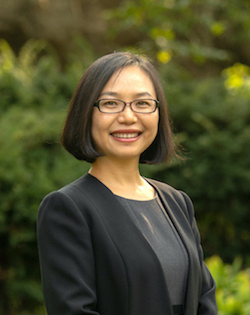PCAL Modern Languages

- Director of Chinese Flagship, Professor of Chinese
- ke.peng@wku.edu
- HCIC 2043
- 270-745-2118
Dr. Ke Peng holds a doctorate in Chinese linguistics and second language acquisition from the University of Arizona. She did her Master’s degree in Foreign Language Education at Indiana University, Bloomington. Dr. Peng coordinates the Chinese major and minor program in the Department of Modern Languages. In addition to building a proficiency-based curriculum and helping students achieve the targeted learning outcomes with performance-oriented instruments, her ultimate mission is to serve students who are passionate about the Chinese language and culture, and support them to make massive and transformational changes in life through holistic learning and intercultural experiences.
As the advisor of the Chinese Club and the coordinator of the Chinese program, Dr. Peng aims to build a cross-functional high performance team to create a student-centered community through innovative collaborations with the instruction team, the student leaders in the Chinese Club and the native speakers of Chinese as language partners and teaching assistants. Dr. Peng offers modern Chinese language instruction at all levels, and occasionally offers courses in Second Language Acquisition and Teaching Methods of Foreign Languages to both undergraduate and graduate students.
College Team Leader, Read-On STARTALK K-16 Master Teacher Program, Summer of 2012-2021
College of the Holy Cross, Worcester, MA
- Lead college professionals to create overarching literacy goals and incremental goals for their curriculum
- Develop best practices in developing literacy in Chinese as a foreign language (CFL) from kindergarten through college
- Situate literacy instruction within a standards-based framework through task-based activities within thematically-defined learning units
- Design formative and summative assessments in three modes of communication to assess literacy development
- Create learning activities differentiated for all proficiency and grade levels (K-16)
- Chinese as a Foreign Language: pedagogy, assessment, teacher training & program evaluation
- Computer-assisted learning, social media instruction, and assessment of online instruction
- Second language acquisition at the semantic-syntactic interface
- Intercultural competence: literacy development and cultural education
*Peng, Ke. & Chen, Chiu-Hung. (2019). CFL Learners’ Perception of Reading: Effects of Unfamiliar Words and Guided Reading Instruction. Journal of International Chinese Language Education. Foreign Language Teaching & Research Press: Beijing.
*Peng, Ke. (2019). Using Social Media to Teach Chinese More Effectively. In Shei, Chris., Chao, Der-Lin., & Zikpi, Monica. (eds.) The Routledge Handbook of Chinese Language Teaching. Routledge.
*Peng, Ke. & Chen, Chiu-Hung. (2017). Identify the Difficulty Index of Chinese Characters Based on CFL Beginners’ Performance. Journal of Chinese Language Teaching. The World Chinese Language Association: Taiwan.
*Dongfeng, Tao. (2016). De-publicized Secularization and Contemporary Chinese Mass Culture (Ke Peng, Trans.). Cultural Studies. New York: Routledge.
*Peng, Ke. (2015). Chapter 7: Chinese as a Foreign Language in K-12 Education. In Ruan, Jiening., Leung, Cynthia., & Zhang, Jie. (eds.) Perspectives on Chinese as a Foreign Language Education. Springer.
Peng, Ke. (2015). Incorporating Authentic Materials to CFL Classes. [Review of the book Encounters: Chinese Language and Culture, by C. Y. Ning & J. S. Montanaro]. The NECTFL Review, Vol. (76), 67-68.
Chen, Chiu-Hung. & Peng, Ke. (2013). The Impact of Instructional Approaches and Task Types on Learner’s Character Retention in Chinese as Foreign Language. Proceedings of International Conference of Association of Teaching Chinese as Second Language (ATCSL 2013).
*Peng, Ke., Mery, Yvonne., & Newby, Jill. (2012). Performance-Based Assessment in an Online Course. Portal: Libraries and the Academy, 12(3).
*Peng, Ke., Mery, Yvonne., & Newby, Jill. (2012). Why One-shot Information Literacy Sessions Are Not the Future of Instruction: A Case for Online Credit Courses. College and Research Libraries. 73(3).
*Peng, Ke., Mery, Yvonne., & Newby, Jill. (2011). Assessing the Reliability and Validity of Locally Developed Information Literacy Test Items. Reference Services Review, 39 (2).
*Peng, Ke. (2008). Chinese Culture Teaching 2.0. Journal of the Chinese Language Teachers Association, 43(3), 81-102.
*Peng, Ke. (2008). Chapter V – Chapter VIII (Trans.). In Liu, J. & Fu, R. (Eds.) A Common European Framework of Reference for Languages, pp. 97-169. Foreign Language Teaching and Research Press: Beijing. (Original work published by the Council of Europe in 2001).

